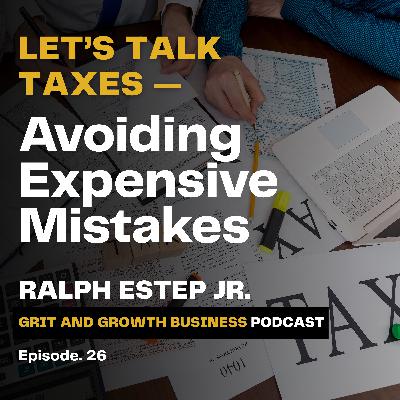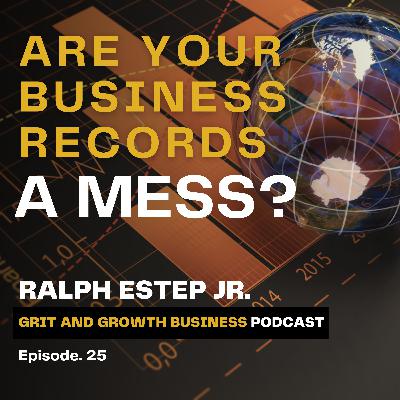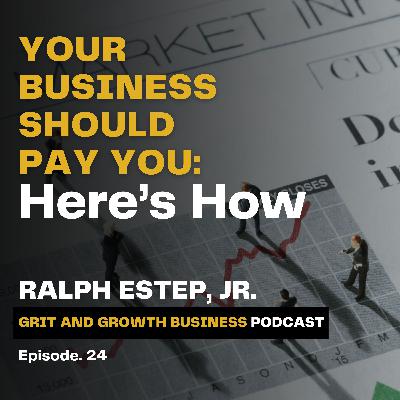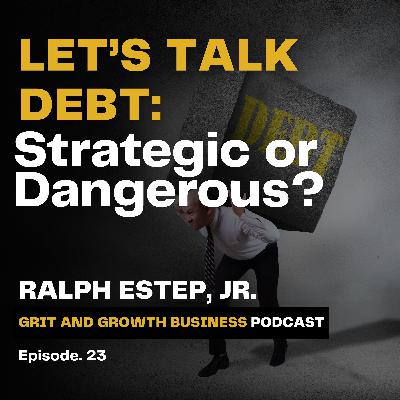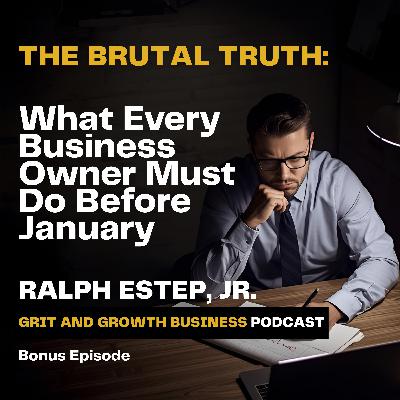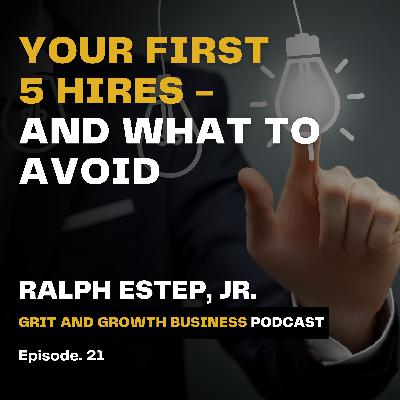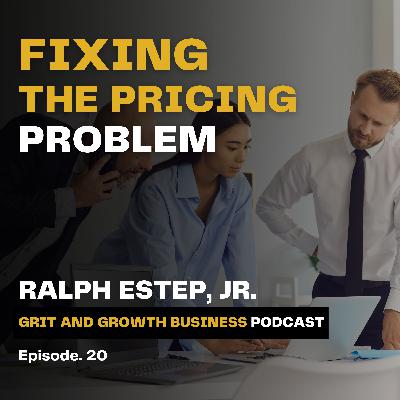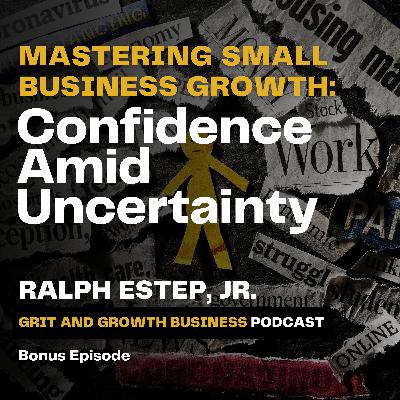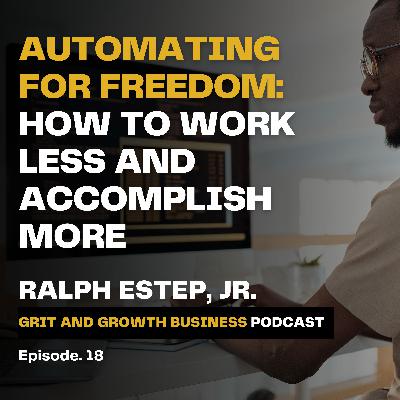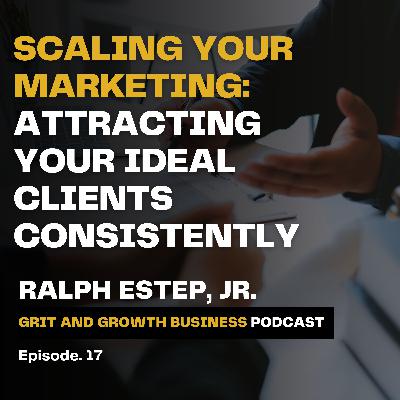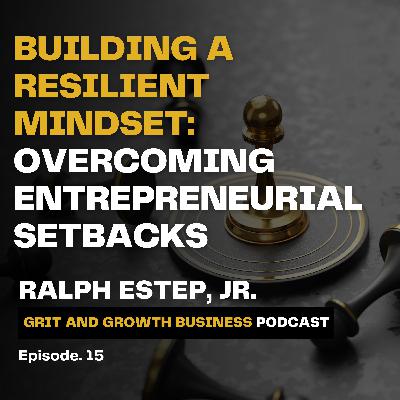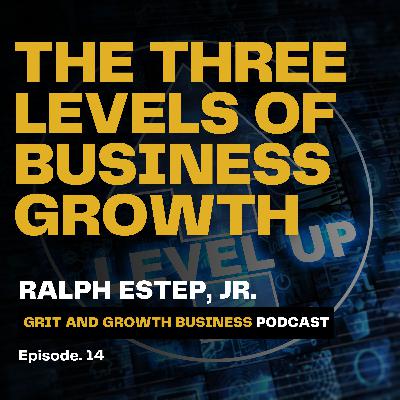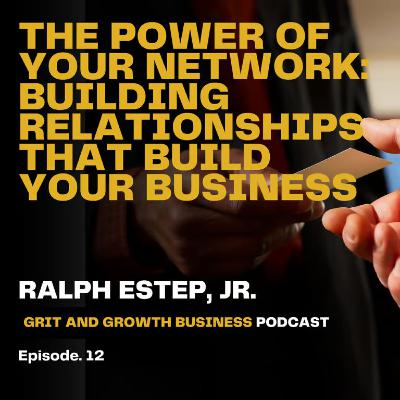Discover Grit and Growth Business
Grit and Growth Business

Grit and Growth Business
Author: Ralph V. Estep, Jr.
Subscribed: 1Played: 0Subscribe
Share
© Copyright 2025 Ralph V. Estep, Jr.
Description
Real Strategies. Real Stories. Real Results.
I know you didn’t build your business the easy way—
and I’m not here to pretend it’s easy now.
I’m Ralph Estep Jr., a business coach, entrepreneur, and accountant with over 30 years of helping small business owners turn their hard work into real success.
On Grit and Growth Business, I share straight-talk coaching, practical strategies, and real-world wisdom to help you build a business that actually supports your life—not one that drains it.
Each week, we’ll tackle the stuff that really matters:
• Pricing with confidence
• Fixing broken systems
• Getting paid on time
• Growing without burning out
No fluff. No hype. Just gritty, honest insight from someone who’s been where you are—and knows how to move forward.
If you’re tired of the overnight-success nonsense and ready to build something that lasts, this show is for you.
👉 Hit follow now, and let’s grow your business—one smart decision, one bold step, one episode at a time.
📈 Visit GritAndGrowthBusiness.com
for tools, coaching, and free resources designed to help you grow with clarity and confidence.
I know you didn’t build your business the easy way—
and I’m not here to pretend it’s easy now.
I’m Ralph Estep Jr., a business coach, entrepreneur, and accountant with over 30 years of helping small business owners turn their hard work into real success.
On Grit and Growth Business, I share straight-talk coaching, practical strategies, and real-world wisdom to help you build a business that actually supports your life—not one that drains it.
Each week, we’ll tackle the stuff that really matters:
• Pricing with confidence
• Fixing broken systems
• Getting paid on time
• Growing without burning out
No fluff. No hype. Just gritty, honest insight from someone who’s been where you are—and knows how to move forward.
If you’re tired of the overnight-success nonsense and ready to build something that lasts, this show is for you.
👉 Hit follow now, and let’s grow your business—one smart decision, one bold step, one episode at a time.
📈 Visit GritAndGrowthBusiness.com
for tools, coaching, and free resources designed to help you grow with clarity and confidence.
31 Episodes
Reverse
The salient point of today's episode hinges upon the critical importance of proactive tax planning for small business owners, particularly as the year draws to a close. As we approach December 31st, many entrepreneurs experience undue stress, often feeling blindsided by unexpected tax liabilities. I wish to emphasize that tax season should not engender feelings of dread; rather, it can be navigated with careful foresight and organization. We will delve into strategies that allow business owners to retain more of their hard-earned income, thereby mitigating the financial impact of tax obligations. Our episode will encompass actionable steps that can be undertaken now to ensure a smoother and more advantageous tax filing experience in the coming months—Let’s Talk Taxes — Avoiding Expensive Mistakes.Read today's blog articleCheck out the full podcast episode hereThis episode breaks down a common struggle many small business owners face as the year ends—stress about taxes. Ralph explains how many entrepreneurs feel anxious or even shocked when they see how much they owe, mostly because they didn’t plan ahead. Instead of waiting until the last minute, Ralph encourages business owners to be proactive by keeping their records organized and checking in with their accountant regularly. To make the message clear, Ralph shares two real examples: one business owner who stayed disorganized and ended up paying more than necessary, and another—a freelancer—who kept track of her finances all year and avoided surprises. These stories show how planning ahead can save both money and stress. The main lessons are simple: keep your financial records organized, set aside money for taxes throughout the year, and stay in touch with your accountant. Doing these things makes tax season much easier and helps you make smarter financial decisions.Takeaways: Every small business owner must engage in thorough tax planning well before the end of the year. Keeping meticulous and organized financial records throughout the year is essential to minimize tax liabilities. Proactive financial management is critical; waiting until tax season to address issues often leads to substantial losses. Separate business and personal finances to ensure clarity and accuracy in financial reporting and tax preparation. Links referenced in this episode:gritandgrowthbusiness.com/actiongritandgrowthbusiness.com/coaching👉 Ready to take your business growth to the next level?Join the Grit and Growth Business Community for exclusive access to weekly action sheets, business toolkits, and behind-the-scenes coaching from Ralph Estep Jr. Move from inspiration to implementation and start building your business with clarity, confidence, and purpose.Join now at gritandgrowthbusiness.com/join
The primary focus of today's episode is the critical importance of maintaining organized and accurate bookkeeping for small business owners, as a significant percentage of business failures can be attributed to cash flow mismanagement stemming from poor financial record-keeping. Many entrepreneurs find themselves overwhelmed by their financial data, often leading to last-minute scrambles during tax season. This episode aims to demystify bookkeeping and emphasize that it is not merely a process of data entry, but rather a vital decision-making tool that provides clarity and insight into one's business operations. We will explore practical strategies for establishing an effective bookkeeping system, including the necessity of separating personal and business finances, and the importance of regular financial reviews. By the conclusion of this episode, listeners will be equipped with actionable steps to enhance their financial practices and ultimately foster greater business success—because when it comes to your numbers, the real question is: Are your business records a mess?Read today's blog articleCheck out the full podcast episode hereTakeaways: Small business owners often struggle with understanding their financial data, leading to poor decision-making. Inaccurate bookkeeping can result in significant financial losses, including missed tax deductions and cash flow issues. Effective bookkeeping should not be viewed merely as data entry, but rather as a critical source of decision-making information. Commingling business and personal finances can create complications, especially during audits and financial assessments. Regular reconciliation of financial records is essential to maintain clarity and avoid costly errors in business operations. Utilizing automated accounting systems can streamline bookkeeping processes, enhancing efficiency and reducing stress. Links referenced in this episode:gritandgrowthbusiness.com/actiongritandgrowthbusiness.com/coachingCompanies mentioned in this episode: QuickBooks Forbes Amazon Hubdoc👉 Ready to take your business growth to the next level?Join the Grit and Growth Business Community for exclusive access to weekly action sheets, business toolkits, and behind-the-scenes coaching from Ralph Estep Jr. Move from inspiration to implementation and start building your business with clarity, confidence, and purpose.Join now at gritandgrowthbusiness.com/join
The central theme of today's discussion revolves around the imperative for small business owners to prioritize their own compensation amidst the myriad demands of entrepreneurship. We delve into the common conundrum faced by many—working extensive hours yet failing to remunerate oneself adequately. Your Business Should Pay You—Here’s How. This episode elucidates strategies to rectify this imbalance, emphasizing the necessity to establish a sustainable cash flow system that guarantees consistent payment to oneself. By highlighting practical methods to differentiate between owner pay and profit, we aim to empower business owners to reclaim their financial worth and prevent burnout. As we navigate through the complexities of financial management, we provide actionable insights designed to foster a healthier relationship with one’s business finances.Read today's blog articleCheck the full podcast episode hereA listener's inquiry serves as the catalyst for a profound discussion on the importance of ensuring that business owners receive compensation for their labor. The speaker, Ralph Estep Jr., addresses the common plight of entrepreneurs who work tirelessly yet fail to pay themselves. He underscores the necessity of establishing a robust cash flow management system that prioritizes owner pay as a non-negotiable line item in the budget. Ralph emphasizes that operating a business should not lead to personal financial depletion but rather to personal financial reward, which is essential for sustaining motivation and avoiding burnout. By dissecting the intricacies of cash flow and owner compensation, he lays out actionable strategies that small business owners can implement to ensure they receive their deserved remuneration, thus transforming their relationship with their business finances.Furthermore, Ralph reveals alarming statistics indicating that a significant percentage of small business owners forgo salaries due to various financial pressures such as debt and vendor payments. His recommendations include setting a fixed percentage of revenue dedicated to owner pay, automating transfers to ensure consistent payment, and separating personal compensation from profits and taxes. These measures aim to create a sustainable financial framework that allows business owners to thrive while maintaining their operational responsibilities. The episode is a clarion call for entrepreneurs to reassess their financial habits and prioritize their own compensation alongside their business commitments.Takeaways: In order to achieve financial stability in your business, prioritize your own salary as a crucial expense. Many small business owners struggle to pay themselves due to high debt and unpredictable revenue streams. Establish a fixed percentage of revenue to allocate to your owner pay account for consistent income. Regularly review and adjust your cash flow and owner's pay to ensure sustainable profitability. Automate the process of transferring funds to your owner's pay account to eliminate emotional decision-making. Consider implementing a quarterly performance bonus for yourself to recognize your contributions to the business. Links referenced in this episode:gritandgrowthbusiness.comgritandgrowthbusiness.com/livegritngrowthbusiness.com/action
Debt plays a crucial role in shaping a business’s growth—it can either serve as a ladder that helps a company climb higher or as a shovel that digs it deeper into financial trouble. In this episode, we tackle a listener’s question about borrowing: how can you tell if debt is working for you or against you? By looking at real-world examples, we’ll break down the difference between using debt strategically to build momentum and falling into the trap of borrowing without a plan. I’ll share a simple three-question framework to help guide your decision-making around taking on debt. The goal is to help business owners make confident, informed choices that drive sustainable growth while managing risk. Let’s talk debt—strategic or dangerous?Read today's blog articleCheck the full podcast episode hereThe episode opens with Ralph responding to a listener’s question about the role of debt in business growth. The listener shares their struggle—recognizing debt as a potential tool for expansion, yet feeling the weight and anxiety of repayment. Ralph explains that this tension is one of the most common dilemmas entrepreneurs face. Drawing from personal experiences and real-world case studies, he contrasts two powerful stories: one where debt is used wisely to fuel sustainable growth, and another where unchecked borrowing leads to financial strain. He introduces a memorable analogy—debt as either a ladder that lifts your business higher or a shovel that digs it deeper—highlighting the importance of knowing which one you’re holding on your financial journey.Ralph also introduces a clear, three-question framework to help business owners make smarter decisions about taking on debt. He encourages them to ask whether the debt will directly generate revenue, if they can sustain payments during slow or uncertain seasons, and whether their decision to borrow is driven by strategy or emotion. By reflecting on these questions, Ralph underscores the importance of approaching debt with intention and discipline. He urges entrepreneurs to borrow with a clear plan and long-term vision, ensuring that debt serves as a tool for empowerment rather than a trap of dependency. The episode concludes with a powerful reminder for listeners to pause and reflect on the motivations behind their financial choices—reinforcing that true and sustainable growth comes from mastering debt, not being mastered by it.Takeaways: The distinction between debt as a tool for growth and as a potential downfall is crucial for business owners to understand. A thorough assessment of one's current debts and the purpose behind them is essential for financial clarity. Understanding the cost of borrowing, particularly the interest rates, is vital to prevent financial distress. Cash flow management is paramount; one must ensure the ability to cover payments even during lean months. It is imperative to evaluate whether borrowing decisions stem from strategic planning or from emotional responses to fear. A structured approach to debt management can either facilitate business growth or lead to debilitating financial burdens. Links referenced in this episode:gritandgrowthbusiness.comgritandgrowthbusiness.com/coachinggritandgrowthbusiness.comliveCompanies mentioned in this...
This episode focuses on one of the biggest challenges small business owners face—how to keep the business running when money is tight. Many entrepreneurs feel the pressure of financial stress, with 57% saying they experience anxiety about money. Still, there’s hope: around 75% of small business owners remain optimistic about their financial future, showing their determination and resilience. We also talk about how inflation and rising costs are major concerns for about 60% of business owners. Finally, we share simple, practical strategies to improve cash flow, strengthen financial stability, and keep your business steady through tough times—showing you exactly how to stay in business when money is tight.Read today's blog articleCheck the full podcast episode hereThe episode begins by asking an important question: how can small business owners keep going when money gets tight? Many entrepreneurs share this struggle—57% say they feel serious stress about their finances, and the host openly admits he’s faced the same challenges. Yet, there’s still hope. About 75% of small business owners remain optimistic about their financial future, showing strong determination even in tough times. The episode takes a closer look at cash flow problems, especially how inflation and rising costs affect nearly 58% of small businesses. It also points out that a lot of business income in the U.S. is stuck in unpaid invoices, making the situation even harder. Throughout the episode, Ralph breaks down the main causes of these financial struggles and shares practical steps to improve cash flow and stay stable. The message is clear: surviving hard times isn’t just about hanging on—it’s about adapting, making smart financial moves, and rebuilding stronger.Takeaways: A substantial 57% of small business proprietors experience significant stress due to financial challenges. It is crucial to maintain open lines of communication with vendors and landlords during economic difficulties. Approximately 24% of American business revenue remains tied up in unpaid invoices, exacerbating cash flow issues. Targeting existing customers for marketing efforts is often more cost-effective than acquiring new clientele. Maintaining a focus on sales growth is essential, especially when financial constraints become prominent. Protecting your core team is vital; losing skilled employees during tough times can hinder recovery. Links referenced in this episode:gritandgrowthbusiness.com/actiongritandgrowthbusiness.com/coachinggritandgrowthbusiness.com/live👉 Ready to take your business growth to the next level?Join the Grit and Growth Business Community for exclusive access to weekly action sheets, business toolkits, and behind-the-scenes coaching from Ralph Estep Jr. Move from inspiration to implementation and start building your business with clarity, confidence, and purpose.Join now at gritandgrowthbusiness.com/join
This podcast episode focuses on how to finish the year with clarity and confidence, especially as business owners face the pressure that comes with the final months of the year. We take time to look back and evaluate what worked well and what didn’t, highlighting the importance of honest reflection. You’ll learn why it’s essential to find a balance between pushing for those last big wins and taking time to rest — because burnout now can hurt your success later. In this episode, I’ll share practical tips to help you end the year strong and set yourself up for a successful start in 2026. Our goal is to help you approach your year-end review with focus and purpose so you can enter the new year refreshed, prepared, and ready to grow. The Brutal Truth: What Every Business Owner Must Do Before January.Read today's blog articleCheck the full podcast episode hereThis podcast episode takes a closer look at the key strategies entrepreneurs should use as they approach the end of the year. Ralph Estep Jr. begins by addressing recent technological disruptions, highlighting how they reveal the natural vulnerabilities that exist within any business. He emphasizes the importance of pausing to reflect on both the wins and the challenges of the past year. By setting aside time for intentional reflection, business owners can gain the clarity and direction needed to move forward effectively. Instead of letting the year-end rush take control, Ralph encourages listeners to slow down, review their progress, and identify what worked well — and what needs to improve — to build a stronger foundation for the year ahead.Ralph shares several practical steps to help business owners reflect effectively as the year comes to a close. He encourages setting aside specific time to review your business performance — not just rushing through it, but intentionally evaluating what worked, what didn’t, and what valuable lessons emerged along the way. This means taking an honest look at where your efforts paid off, where resources may have been wasted, and how unexpected challenges shaped your growth. He also reminds listeners of the importance of balance — that true, long-term success isn’t built on constant hustle alone, but also on recognizing the need for rest and renewal. By making reflection and rest a priority, business owners can strengthen their mindset and strategy for the year ahead. Ultimately, the episode calls on leaders to finish the year with focus and intention, building resilience and laying the groundwork for sustainable success in the coming year.Takeaways: The critical essence of achieving success in business lies in conducting a thorough year-end assessment and reflection process. One must recognize the importance of acknowledging both wins and losses to foster growth and resilience for the upcoming year. Balancing the relentless drive for achievement with the necessity of rest is paramount to prevent burnout and sustain productivity. Identifying and documenting key lessons learned throughout the year is essential for strategic growth and improved decision-making in the future. Links referenced in this episode:gritandgrowthbusiness.com/coachinggritandgrowthbusiness.com/guestgritandgrowthbusiness.com/actionCompanies mentioned in this episode: Amazon Saggio Accounting...
The primary focus of this podcast episode centers upon the significant challenges that small business owners encounter when it comes to hiring, particularly in the current competitive landscape wherein 66% of these proprietors express difficulty in recruitment. The episode delves into alarming statistics indicating that a considerable percentage of small business owners are facing a dearth of qualified applicants, with 43% reporting a scarcity of suitable candidates for their open positions. Furthermore, Ralph highlights the critical need for strategic hiring decisions, emphasizing that the initial hires made by a business can either catalyze growth or precipitate costly mistakes. Throughout the episode, we explore essential questions regarding when to hire, whom to hire first, and how to ensure that hiring decisions yield positive returns on investment. Ultimately, we aim to equip listeners with actionable insights and methodologies for cultivating a workforce that not only complements but enhances their business operations. This episode, “Your First 5 Hires (And What to Avoid),” offers practical guidance to help business owners make confident, strategic hiring decisions that set the foundation for long-term success.Read today's blog articleCheck the full podcast episode hereThis episode discusses the common struggles small business owners face today, especially with hiring and keeping good employees. About 66% say hiring is difficult, and 43% report not finding enough qualified candidates. It focuses on why making smart hiring choices early on is so important — the first few hires can shape the future of a business. It also covers which roles to prioritize to ease daily operations and boost revenue, as well as how to build a positive workplace culture that helps attract and retain great talent for long-term growth.Takeaways: The current hiring landscape for small business owners is particularly challenging, with 66% indicating significant difficulty in hiring qualified candidates. Statistics reveal that nearly two-thirds of small business owners report a severe shortage of qualified applicants for open positions, affecting their operational capabilities. Retention of skilled employees is a pressing concern for 55% of small business owners, highlighting the importance of effective hiring practices. Successful hiring hinges on clear expectations and measurable outcomes, ensuring that each new hire contributes to business growth rather than creating additional burdens. Links referenced in this episode:gritandgrowthbusiness.com/actiongritandgrowthbusiness.com/livegritandgrowthbusiness.com/coaching👉 Ready to take your business growth to the next level?Join the Grit and Growth Business Community for exclusive access to weekly action sheets, business toolkits, and behind-the-scenes coaching from Ralph Estep Jr. Move from inspiration to implementation and start building your business with clarity, confidence, and purpose.Join now at gritandgrowthbusiness.com/join
This podcast episode tackles the growing credit crunch that’s challenging small business owners as lending tightens and interest rates rise. I share five practical financial strategies to help you finish 2025 strong and start 2026 on solid ground. We’ll discuss how to build liquidity before you need it, strengthen your financial profile to earn lender confidence, and diversify your funding sources to reduce risk. I also highlight the importance of keeping clear and organized financial records to avoid year-end chaos. This episode is designed to give business owners actionable insights to boost financial resilience, ensure stability, and create lasting growth—captured perfectly in the theme, “Finish the Year Strong: 5 Smart Money Moves Every Small Business Owner Should Make Before December 31.”Read today's blog articleCheck the full podcast episode hereNavigating today’s financial landscape requires awareness, adaptability, and strategic action—especially amid the current credit crunch. In this episode, we explore key steps small business owners can take to strengthen their financial resilience as the year draws to a close. We begin by addressing the tightening credit markets, where lenders are becoming increasingly selective. With rising interest rates and stricter lending standards, it’s more important than ever to build liquidity before you need it. Establishing a reserve fund not only stabilizes your finances but also builds lender confidence and positions your business for future opportunities. Maintaining accurate, organized financial records is equally essential, as a strong financial profile enhances credibility and improves access to capital when challenges arise.Takeaways: The pressing issue of the week revolves around the current credit crunch affecting many small businesses, which necessitates strategic financial planning. Building liquidity before needing it is essential; small business owners should prioritize creating cash reserves to alleviate future financial stress. Strengthening one's financial profile through accurate bookkeeping and transparent financial records enhances a business's credibility with lenders during tough economic times. Diversity in funding sources is crucial; establishing relationships with multiple banks can provide flexibility and options in times of financial need. Links referenced in this episode:gritandgrowthbusiness.comgritandgrowthbusiness.com/askgritandgrowthbusiness.com/actiongritandgrowthbusiness.com/coaching👉 Ready to take your business growth to the next level?Join the Grit and Growth Business Community for exclusive access to weekly action sheets, business toolkits, and behind-the-scenes coaching from Ralph Estep Jr. Move from inspiration to implementation and start building your business with clarity, confidence, and purpose.Join now at gritandgrowthbusiness.com/join
This episode tackles one of the biggest challenges small businesses face — pricing. Only 46% of small firms made a profit in 2023, while more than a third operated at a loss. Many business owners, especially those running micro businesses, worry deeply about their revenue. A listener asks how to raise prices without losing customers, a struggle most entrepreneurs can relate to. I explain that pricing isn’t just about numbers — it’s about the value you create, the transformation you deliver, and how you position your business. In this episode, I share simple, practical steps to help business owners build confidence, grow sustainably, and start fixing the pricing problem.Read today's blog articleCheck the full podcast episode hereA series of statistics reveal the fragile state of small businesses in 2023 and 2024, showing that only 46% reported profits while 41% saw their revenues decline. This episode explores the tough reality faced by micro businesses, with 44% naming revenue as their biggest concern. These numbers set the stage for a powerful discussion on pricing — sparked by a listener’s question about finding the balance between raising prices and keeping customers. Host Ralph Estep Jr., drawing from over 30 years of experience, explains that pricing isn’t just about numbers; it’s about how customers perceive value and how businesses stay financially healthy. Through real stories and practical wisdom, Ralph reveals how poor pricing decisions can harm a business and challenges listeners to rethink their approach.Takeaways: In 2023, only 46% of small businesses with employees reported profitability, indicating a significant challenge for entrepreneurs. A staggering 41% of small businesses experienced revenue declines in 2024, with just 38% noting revenue gains, highlighting market difficulties. Micro businesses, defined as those with one to four employees, are particularly stressed, with 44% citing revenue concerns as a major issue. Pricing is not merely an arithmetic exercise; rather, it embodies a complex balance between perceived value and market dynamics. Many small business owners fear that raising prices will result in customer loss, yet it is often necessary to ensure sustainability. Developing a sound pricing strategy is crucial for small business success, as underpricing can lead to burnout and financial instability. Links referenced in this episode:gritandgrowthbusiness.com/actiongritandgrowthbusiness.com/coachinggritandgrowthbusiness.com/live👉 Ready to take your business growth to the next level?Join the Grit and Growth Business Community for exclusive access to weekly action sheets, business toolkits, and behind-the-scenes coaching from Ralph Estep Jr. Move from inspiration to implementation and start building your business with clarity, confidence, and purpose.Join now at gritandgrowthbusiness.com/join
This podcast episode focuses on the idea that uncertainty is a natural part of being an entrepreneur. I talk about the common struggles small business owners face, such as unpredictable cash flow and changing client relationships, which can often lead to doubt and anxiety. Instead of trying to remove uncertainty completely, I highlight the importance of learning how to manage it effectively. I share practical tips like tracking cash flow weekly and setting up a financial buffer to handle unexpected challenges. Together with our listeners, we talk about how to stay resilient and focused on long-term goals despite the ups and downs of business. It’s all about Mastering Small Business Growth: Confidence Amid Uncertainty.Read today's blog articleCheck the full podcast episode hereThe first episode of Grit and Growth Business Live explores the common challenges small business owners face—especially dealing with uncertainty. Ralph Estep Jr. reminds listeners that uncertainty isn’t just an obstacle; it’s a constant part of the entrepreneurial journey. Drawing from real-life stories and insights from thought leaders like Stephen Covey, Ralph highlights that the only real certainty in business is uncertainty itself. He shares practical ways to handle it with confidence, such as tracking cash flow weekly to stay aware and reduce stress, and building a financial buffer to prepare for unexpected events. Ralph also encourages focusing on what can be controlled—like improving customer relationships and service quality. The episode wraps up with a powerful message: lasting success comes from mastering your response to uncertainty. Takeaways: The inevitability of uncertainty in the entrepreneurial journey demands resilience and adaptability from business owners. Establishing a buffer fund of several weeks' expenses can provide essential financial stability during turbulent times. Tracking cash flow weekly, rather than monthly, fosters awareness that can mitigate anxiety and enhance decision-making. Clarity in business direction can be achieved through intentional actions, rather than reactive measures, for sustained growth. Effective entrepreneurship necessitates a commitment to continuous learning and iteration, underscoring the importance of testing ideas before full-scale implementation. The alignment of business growth with a clear purpose is essential to ensure that efforts are meaningful and impactful. Links referenced in this episode:gritandgrowthbusiness.com/askgritandgrowthbusiness.com/guestfinanciallyconfidentchristian.comCompanies mentioned in this episode: Saggio Accounting Plus 👉 Ready to take your business growth to the next level?Join the Grit and Growth Business Community for exclusive access to weekly action sheets, business toolkits, and behind-the-scenes coaching from Ralph Estep Jr. Move from inspiration to implementation and start building your business with clarity, confidence, and purpose.Join now at gritandgrowthbusiness.com/join
The pressing issue of budgeting for small business owners is addressed with a transformative perspective: budgeting does not need to be a complex and daunting endeavor. Instead, I propose a straightforward three-bucket system that facilitates clarity, control, and confidence in financial management. This episode elucidates the significance of understanding one's finances, highlighting that 82% of business failures are attributed to poor cash flow management and a lack of financial insight. We delve into the detrimental mindset that equates budgeting with restriction, urging a paradigm shift that views it as a strategic roadmap. I will share practical insights and anecdotes from clients who have successfully implemented this simplified budgeting framework, illustrating how it empowers them and alleviates the stress associated with financial uncertainty—making this Your Business Budget, Finally Simplified.Read today's blog articleCheck the full podcast episode hereThe episode begins with a thought-provoking question about the word “budget”, uncovering how many small business owners feel uneasy or even resistant to it. Ralph explains that for most people, the word brings to mind complicated spreadsheets and constant reminders of financial struggles. In fact, a U.S. bank study shows that 82% of businesses fail because of poor cash flow management and a lack of financial know-how. Ralph emphasizes that this statistic isn’t about bad luck—it’s the result of weak budgeting habits. The key message of the episode is that budgeting doesn’t have to be difficult; when simplified, it can give business owners more clarity, control, and confidence with their money.At the heart of the episode is a simple three-bucket budgeting system designed to take the stress out of managing money. The first bucket covers operating expenses—things like rent, payroll, and utilities. Ralph points out that these costs should stay within 50–70% of total revenue to keep the business healthy and profitable. The second bucket is set aside for the owner’s pay, which he stresses is non-negotiable. Business owners should aim to pay themselves 20–30% of revenue to make sure their hard work is rewarded and their motivation stays strong. The final bucket focuses on future profits and growth, including money for taxes, savings, and investments in expansion. This should take up 10–20% of revenue, creating a solid foundation for long-term success.Ralph shares real-life stories from his clients to show how powerful this budgeting system can be. One example is Lisa, a bakery owner who was spending 85% of her revenue just to keep the business running. With a few smart changes, she brought that number down to 65%—and for the first time in years, she was finally able to pay herself. The episode wraps up with a call to action for listeners to try this simple budgeting approach, start tracking their expenses, and shift to a proactive mindset about money. Ralph's goal is to build confidence in small business owners and give them the tools to take control of their finances, breaking free from the cycle of stress and uncertainty that holds so many back.Takeaways: The concept of budgeting evokes a sense of dread and complexity for many small business owners. A staggering 82% of businesses fail primarily due to inadequate cash flow management and financial illiteracy. Implementing a simplified three-bucket budgeting system can significantly enhance financial clarity and control. Understanding your numbers is essential; as Robert Kiyosaki stated, "If you don't know your numbers, you don't know your business." Budgeting should be viewed as a...
Today’s episode asks a powerful question: What could you do if you had six extra weeks in your year? We explore how automation can help you win back that time by cutting out repetitive, time-consuming tasks. Many small business owners get stuck in endless admin work, leaving little energy for the projects that really move their business forward. In this episode, we share practical ways to use automation to boost productivity, free up your schedule, and bring more balance to your work and life. It’s about seeing the hidden cost of inefficiency—and discovering how the right systems can give you back both your time and your freedom. This is Automating for Freedom: How to Work Less and Accomplish More.Read today's blog articleCheck the full podcast episode hereThis episode takes a deep look at time management and productivity, making a strong case for why small businesses need automation. Ralph asks a powerful question: “What would you do with six extra weeks this year?” It’s both an invitation and a challenge for entrepreneurs to reflect on how they spend their time. Too often, repetitive tasks eat up hours without moving the business forward. By introducing the idea of automating for freedom, this episode shows how the right systems can free you from busywork and help you focus on high-value activities that truly align with your mission.In this episode, Ralph shines a light on the hidden costs of manual labor—everything from emotional fatigue to financial strain. Through relatable stories and eye-opening stats, we see just how much time gets wasted on routine administrative tasks—time that could be better spent on meaningful work. Listeners are introduced to the concept of a “drudgery audit,” a practical way to identify the tasks that drain energy and resources. The message is simple: start small by automating just one task at a time. Over time, this builds a smoother, more efficient workflow—freeing up energy, restoring focus, and reigniting passion for the work that matters most.Takeaways: Reclaiming six weeks of your year necessitates the implementation of automation in daily tasks. Automation alleviates the burden of repetitive administrative work, allowing for personal and professional growth. The emotional toll of excessive manual work may lead to exhaustion, affecting both personal and professional relationships. Effective time management involves prioritizing important tasks rather than merely scheduling them as they arise. Links referenced in this episode:gritandgrowthbusiness.comgritandgrowthbusiness.com/actiongritandgrowthbusiness.com/coachingCompanies mentioned in this episode: Grit and Growth Business Acuity QuickBooks FreshBooks Asana Trello Zapier Zendesk Microsoft 👉 Ready to take your business growth to the next level?Join the Grit and Growth Business Community for exclusive access to weekly action sheets, business toolkits, and behind-the-scenes coaching from Ralph Estep Jr. Move from inspiration to implementation and start building your business with clarity, confidence, and purpose.Join now at gritandgrowthbusiness.com/join
This episode focuses on the consequences of inconsistent marketing, which often leads to unpredictable revenue and threatens the stability of small businesses. It highlights the common struggle entrepreneurs face with the exhausting feast-or-famine cycle caused by irregular marketing efforts. Research shows that 82% of small businesses fail due to cash flow problems, many of which are linked to the absence of a reliable marketing system. Through shared experiences and insights, Ralph underscores the importance of having a clear strategy to bring in a steady flow of ideal clients. The goal is to turn marketing from a chaotic process into a consistent system that drives growth and stability—Scaling Your Marketing: Attracting Your Ideal Clients Consistently.Read today's blog articleCheck the full podcast episode hereTakeaways: The feast or famine cycle afflicts many small businesses, leading to inconsistent revenue streams. Inconsistent marketing often results in wasted time and money on ineffective strategies. Defining an ideal client is crucial for creating targeted and effective marketing efforts. Building a predictable marketing system can alleviate the pressures of sporadic client acquisition. Establishing a consistent content calendar is vital for maintaining client engagement and trust. Regular follow-ups are necessary, as 80% of sales require multiple touches to convert leads. Links referenced in this episode:gritandgrowthbusiness.comgritandgrowthbusiness.com/coachinggritandgrowthbusiness.com/action👉 Ready to take your business growth to the next level?Join the Grit and Growth Business Community for exclusive access to weekly action sheets, business toolkits, and behind-the-scenes coaching from Ralph Estep Jr. Move from inspiration to implementation and start building your business with clarity, confidence, and purpose.Join now at gritandgrowthbusiness.com/join
The principal focus of this podcast episode is the revolutionary Profit First system, which fundamentally alters the traditional approach to financial management in small businesses. We delve into the pervasive issue faced by many entrepreneurs: the struggle to achieve profitability despite diligent efforts and consistent revenue generation. This episode elucidates the pervasive cash crunch that often plagues small business owners, leading to financial anxiety and a sense of perpetual instability. We assert that profit should not merely be an afterthought but rather an integral component of the financial framework, prompting a paradigm shift in how profits are prioritized and allocated. Through the introduction of practical steps and strategies, we aim to empower listeners to implement this transformative model, thereby ensuring financial stability, fostering a sustainable growth trajectory, and embracing Profit First Principles: How to Guarantee Your Business is Always Profitable.Read today's blog articleCheck the full podcast episode hereThe podcast delves into the often overlooked yet pivotal concept of financial management within small businesses, emphasizing the necessity for a paradigm shift in how profits are perceived and prioritized. The speaker articulates the pervasive struggle among entrepreneurs, who, despite hard work and revenue generation, frequently find themselves ensnared in a cycle of financial anxiety characterized by insufficient profits and constant cash flow concerns. This episode is predicated on the revolutionary Profit First methodology, which posits that profits should be allocated before expenses, thereby ensuring that business owners receive their rightful compensation and fostering a healthier financial ecosystem. Through a series of compelling anecdotes and practical insights, Ralph outlines the profound implications of adhering to traditional profit models that often render profit merely a theoretical concept. By systematically dissecting the detrimental effects of this conventional approach, the podcast advocates for a proactive stance where profit becomes a guaranteed aspect of business operations. The listener is invited to explore the transformative potential of restructuring their financial habits to prioritize profit and, consequently, personal financial stability, thus paving the way for sustainable growth and entrepreneurial success.Takeaways: Profit First is a revolutionary financial management system that guarantees business owners are paid first. The traditional business model often leads to cash flow issues and financial stress for entrepreneurs. Implementing Profit First requires creating multiple dedicated bank accounts to manage income and expenses effectively. Allocating a percentage of income to profit and owner pay accounts leads to sustainable financial growth. Links referenced in this episode:gritandgrowthbusiness.comgritandgrowthbusiness.com/coachinggritandgrowthbusiness.com/action👉 Ready to take your business growth to the next level?Join the Grit and Growth Business Community for exclusive access to weekly action sheets, business toolkits, and behind-the-scenes coaching from Ralph Estep Jr. Move from inspiration to implementation and start building your business...
The focus of today’s discussion is the importance of building a resilient mindset to handle the setbacks every entrepreneur will face. Challenges can take an emotional and mental toll, but they also bring opportunities to grow. By sharing real experiences, like the tough reality of losing major clients, we show how resilience shapes both personal and professional growth. Along with these stories, we offer practical strategies to strengthen mental toughness, helping entrepreneurs bounce back with clarity and renewed energy. This message is a reminder to see setbacks not as roadblocks, but as essential steps on the path to success—the heart of Building a Resilient Mindset: Overcoming Entrepreneurial Setbacks.Read today's blog articleCheck the full podcast episode hereThe podcast delves into the inevitable challenges faced by entrepreneurs, emphasizing that setbacks are not merely possibilities but guaranteed events. Ralph Estep Jr. articulates the emotional turmoil that accompanies the loss of significant clients, illustrating his personal experience of despair and self-doubt following such incidents. He discusses the psychological barriers that entrepreneurs often face, such as paralysis from fear, overwhelming self-doubt, and the emotional drain that can spill over into personal lives. Ralph highlights the importance of developing a resilient mindset, which acts as a protective buffer against the adversities of entrepreneurial life. He encourages listeners to view setbacks as learning opportunities rather than definitive failures, thus transforming them into stepping stones for future success. By fostering a resilient mindset, entrepreneurs can navigate challenges more effectively, ensuring that their journey towards success is imbued with strength and perseverance.Takeaways: Entrepreneurial setbacks are inevitable and must be confronted with a resilient mindset. The ability to bounce back from adversity is a critical skill for long-term success. Processing emotions and learning from failures are essential steps in overcoming challenges. Maintaining a focus on one's core purpose can provide motivation during difficult times. Links referenced in this episode:gritandgrowthbusiness.comgritandgrowthbusiness.com/coachinggritandgrowthbusiness.com/action👉 Ready to take your business growth to the next level?Join the Grit and Growth Business Community for exclusive access to weekly action sheets, business toolkits, and behind-the-scenes coaching from Ralph Estep Jr. Move from inspiration to implementation and start building your business with clarity, confidence, and purpose.Join now at gritandgrowthbusiness.com/join
The salient inquiry presented in this bonus episode revolves around the profound struggle faced by numerous small business owners: how to cultivate a profitable enterprise that simultaneously affords them the opportunity to reclaim their personal lives and be present for their loved ones. This question, articulated with raw honesty, resonates deeply with many who find themselves ensnared in the relentless demands of their entrepreneurial endeavors. As I reflect on my own experiences, I acknowledge that the pursuit of success often leads to a compromising of familial relationships and personal well-being. Thus, I delve into the critical distinction between working harder and working smarter, emphasizing the necessity of developing effective systems that facilitate business operations without the toll of personal sacrifice. Ultimately, this episode seeks to illuminate a path toward achieving both professional success and cherished personal connections, underscoring that true freedom does not stem from excessive labor but rather from strategic efficiency in one's business practices. How do we go about reclaiming freedom and find time for the things which really matter in life.Takeaways: The question posed by many small business owners is whether they are truly free or enslaved by their own enterprises. Achieving a balance between work and family life is paramount for long-term happiness and fulfillment. Implementing systems within a business is essential for reducing fatigue and reclaiming personal time. A thorough time audit can reveal surprising insights about how time is spent on various tasks. Reflecting on the original purpose for starting a business can reignite motivation and guide future decisions. Delegating tasks and creating efficient systems ultimately leads to increased profitability and personal satisfaction.
Today’s focus is on breaking down the three levels of business growth—a framework that shows how a business can evolve from its early stages into a self-sustaining enterprise. Many entrepreneurs, despite working hard, find themselves feeling stuck and unsure of what to do next. This episode will explain why that feeling is common and how it often comes from not knowing the next strategic step to take. I’ll share practical insights to help you identify where you are on the growth ladder and what you need to do to move forward. By the end of our discussion, you’ll have the tools to reach new levels of profit, freedom, and impact in your entrepreneurial journey, guided by The Three Levels of Business Growth.Read today's blog articleCheck the full podcast episode hereIn this episode, we explore the journey of business growth as a progression through three key levels. Host Ralph Estep Jr. sheds light on the common struggles entrepreneurs face, especially the feeling of being stuck despite constant effort. He compares this to reaching an emotional plateau—being busy yet unfulfilled. Ralph explains that breaking through this stage requires seeing growth not as a one-time event, but as a strategic journey built on understanding where you are in your business. By outlining the three stages—Operator, Manager, and Strategist—he offers a clear framework to help entrepreneurs recognize their challenges and take practical steps forward. His insights highlight the importance of shifting your mindset, building systems, and developing leadership skills that allow teams to run independently—freeing you to focus on vision, strategy, and long-term growth.Takeaways: The journey of business growth is akin to ascending a ladder, with distinct levels requiring different strategies. Understanding where one currently stands in their business growth can illuminate actionable steps for advancement. Effective delegation is essential; without it, business owners risk stagnating and returning to the burdens of micromanagement. A strategic retreat can foster visionary thinking, helping owners to identify new opportunities and future growth pathways. Cultivating a culture of accountability and ownership within the team is vital for sustainable growth and success. Recognizing the difference between doers and leaders within a business team can profoundly impact overall effectiveness and growth. Links referenced in this episode:gritandgrowthbusiness.comgritandgrowthbusiness.com/actiongritandgrowthbusiness.com/coaching👉 Ready to take your business growth to the next level?Join the Grit and Growth Business Community for exclusive access to weekly action sheets, business toolkits, and behind-the-scenes coaching from Ralph Estep Jr. Move from inspiration to implementation and start building your business with clarity, confidence, and purpose.Join now at gritandgrowthbusiness.com/join
This episode explores a common but rarely talked about issue—when entrepreneurs start to feel frustrated, trapped, or even resentful toward their own businesses. We dive into the emotional challenges that can come with running a business and why it’s so important to recognize these feelings. They’re often signs that something needs to change. By sharing honest personal experiences and practical tips, we hope to help listeners reconnect with the passion that first inspired them. This conversation is all about finding a way forward—what to do when you hate your business.Read today’s blog articleCheck out the full podcast episode hereThis podcast episode tackles a deep but often overlooked issue many entrepreneurs face—feeling resentment toward their own business. Host Ralph Estep Jr. shares a relatable story that starts with the excitement of launching a business but slowly turns into feelings of dread and being stuck. He opens up about the emotional toll this can take and encourages listeners to reflect on their own guilt and frustration. Ralph offers empathy and reminds entrepreneurs they’re not alone in these struggles. The episode also shares practical tips for getting back on track, focusing on being honest with yourself and digging into what’s really causing the disconnect. In the end, it’s a call to step back, reevaluate, and rediscover the passion that started it all.Takeaways: Feeling trapped in a business you once loved can lead to profound resentment. Many entrepreneurs experience moments of dread when thinking about their businesses. It is essential to recognize the signs of burnout and exhaustion in your work. Reclaiming passion in your business requires identifying and delegating tasks you despise. Financial pressure can create a sense of entrapment that drains your joy. The importance of reconnecting with your original purpose cannot be overstated. Links referenced in this episode:gritandgrowthbusiness.comgritandgrowthbusiness.com/actiongritandgrowthbusiness.com/coaching👉 Ready to take your business growth to the next level?Join the Grit and Growth Business Community for exclusive access to weekly action sheets, business toolkits, and behind-the-scenes coaching from Ralph Estep Jr. Move from inspiration to implementation and start building your business with clarity, confidence, and purpose.Join now at gritandgrowthbusiness.com/join
Today’s discussion is about building real, genuine relationships in your professional network—avoiding the shallow, give-and-take approach that traditional networking often promotes. We’ll talk about how leading with generosity can create lasting partnerships that help your business grow. We’ll also reflect on the dangers of working in isolation and the opportunities you miss when you neglect your network. The key idea is that effective networking isn’t just about what you can get—it’s about offering value to others and creating a cycle of support and collaboration. Our goal is to help you see your network as a powerful resource that can drive both your business success and your personal fulfillment—a concept we call The Power of Your Network: Building Relationships That Build Your Business.Read today’s blog articleCheck out the full podcast episode hereThe episode culminates in a call-to-action for listeners to reevaluate their networking practices and invest in developing authentic relationships. Ralph encourages a paradigm shift where networking is viewed not merely as a means to an end but as an integral aspect of business and personal development. By sharing specific strategies such as identifying one's networking niche, leading with generosity, and committing to intentional presence during interactions, the episode provides a comprehensive framework for building a meaningful network. The overarching message is one of empowerment; listeners are urged to take proactive steps towards creating a vibrant network that can amplify their business growth. Ralph concludes with an invitation for further engagement, offering resources and personalized support to help entrepreneurs navigate their unique challenges in cultivating authentic connections. This episode serves as a vital reminder that the strength of one's network directly correlates to the potential for success, underscoring the notion that connections truly constitute one's net worth.Takeaways: Building authentic relationships is paramount for small business success and growth. Networking should not be perceived as transactional but rather as an opportunity for genuine connection. Isolation significantly limits opportunities for business owners, hindering both personal and professional growth. Leading with generosity by offering value first fosters stronger connections in business networking. Links referenced in this episode:gritandgrowthbusiness.comgritandgrowthbusiness.com/actiongritandgrowthbusiness.com/coaching👉 Ready to take your business growth to the next level?Join the Grit and Growth Business Community for exclusive access to weekly action sheets, business toolkits, and behind-the-scenes coaching from Ralph Estep Jr. Move from inspiration to implementation and start building your business with clarity, confidence, and purpose.Join now at gritandgrowthbusiness.com/join
Today, we're talking about the real and life-changing journey of being an entrepreneur. I’ll be sharing personal stories from my own experience—what it’s really like to build a business. We’ll talk about the tough stuff, like dealing with cash flow problems and feeling burned out, as well as the key strategies that have helped me keep going for over 30 years. I’ll be honest about the mistakes I’ve made and the hard lessons I’ve learned along the way, showing that success doesn’t come easy—it takes grit and determination. I’ll also walk you through the three main things that keep my businesses strong: being honest about money, putting systems in place, and focusing on helping people, not just making sales. This episode isn’t just about my story—it’s a reminder that we all have the strength to push through challenges and grow, no matter how hard things get. It’s Grit and Growth: My Story, My Strategy.Read today’s blog articleCheck out the full podcast episode hereIn this episode, Ralph Estep Jr. opens up about his personal journey as an entrepreneur, sharing honest stories filled with real challenges and hard-earned lessons. He talks about the fears and doubts many business owners face—like unpredictable finances and the risk of burnout—and how those struggles shaped who he is today. Starting out in the world of accounting, Ralph shares how he grew from a beginner into a trusted coach, offering guidance from a place of experience.One of the biggest lessons he shares is the importance of knowing your numbers. Ralph explains that your finances aren’t something to be afraid of—they’re tools that help you make smarter decisions and grow your business. He reflects on a time when avoiding his finances led to stress and confusion, and how facing them head-on gave him more control and peace of mind.Ralph also breaks down the three key pillars that have helped him succeed: being honest about your financial situation, building systems to run your business smoothly, and shifting your mindset from just making sales to truly serving people. His advice is practical and encouraging, giving entrepreneurs real steps they can take right now.Takeaways: The journey of entrepreneurship is fraught with challenges, requiring grit and resilience amidst overwhelming pressures. Understanding one’s financial metrics serves not merely as a business necessity, but as an essential compass for strategic decision-making. Systematizing business processes is imperative for scaling operations and ensuring sustained quality in service delivery. Sales should be reframed as a service, focusing on solving client problems rather than mere transactional exchanges. Links referenced in this episode:gritandgrowthbusiness.comgritandgrowthbusiness.com/actiongritandgrowthbusiness.com/coaching👉 Ready to take your business growth to the next level?Join the Grit and Growth Business Community for exclusive access to weekly action sheets, business toolkits, and behind-the-scenes coaching from Ralph Estep Jr. Move from inspiration to implementation and start building your business with clarity, confidence, and purpose.Join now at gritandgrowthbusiness.com/join


